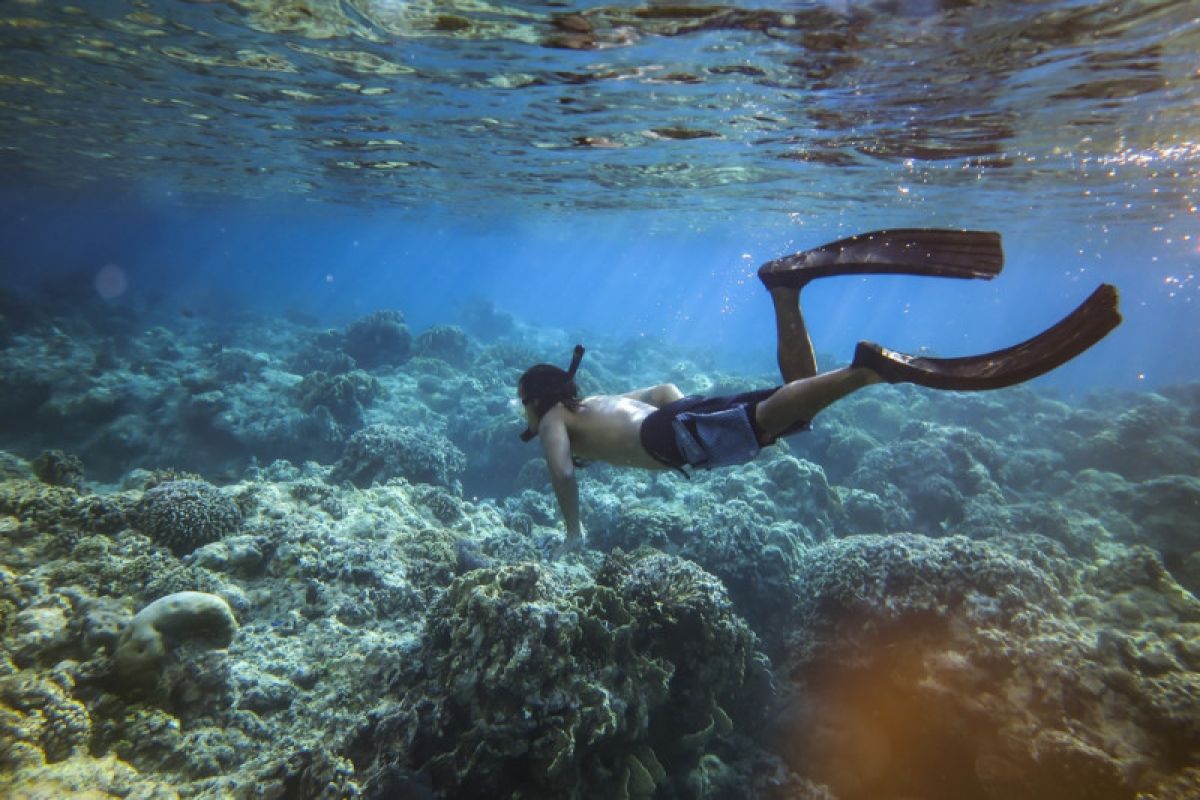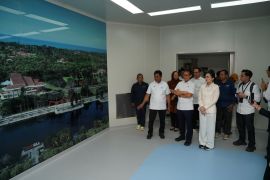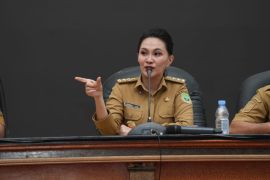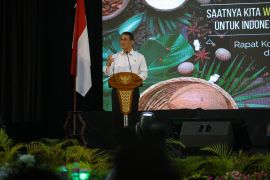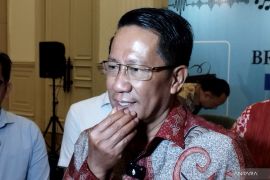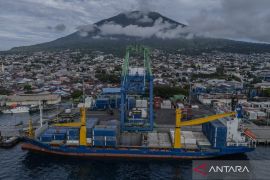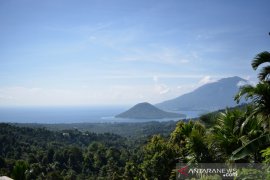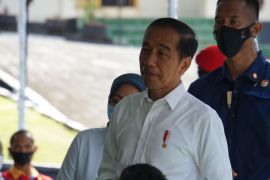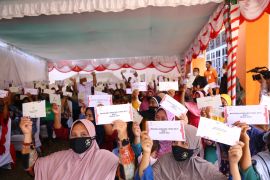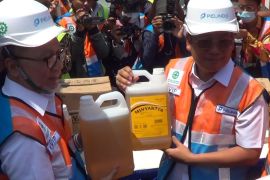Local wisdom in preserving the environment, in empowering the community, and in sharing the natural resources, all has long been regulated in our customary lawJakarta (ANTARA) - Indonesia is the largest archipelagic country in the world, with its 17,508 islands spread over an area of nearly two million square kilometers.
Five of the largest islands in the country are Kalimantan, which is spread over an area of approximately 743 thousand square kilometers; Papua, which spans 289 thousand square kilometers; Sumatra, 431 thousand square kilometers; Sulawesi, 173 thousand square kilometers; and, Java, 128 thousand square kilometers.
Three of the five major islands of Indonesia are among the largest islands in the world — Kalimantan, Sumatra, and Papua.
As residents of an archipelagic nation covering an area of 7.81 million square kilometers, of which about 3.23 million square kilometers comprises seas and oceans, the lives of Indonesians are inseparably entwined with the country's maritime life.
Hence, it is not surprising that quite a number of Indonesians work as fishermen, as is the case in the coastal villages of South Halmahera district in North Maluku.
Apart from farming, many people in North Maluku depend on marine products for their livelihoods.
Such marine livelihoods are no exception for residents of the coastal village of a small island called Sali Kecil (Small Sali), which is flanked by Bacan Island in the west and Halmahera Island in the east.
Ibramin Nasir, a resident of Sali Kecil village who works as a fisherman, recognizes the superiority of his village in the fisheries sector. Fishermen from the village still fish traditionally, that is, they catch fish by venturing into the sea on small boats, he said.
The village on the small island is indeed blessed with marine resources. This is evidenced by the collection of tropical fish that can be easily seen through the clear sea waters hugging the island.
Swimmers exploring the colorful coral reefs near the Sali Kecil village's pier can easily catch sight of a variety of colorful tropical fish, especially when the sunlight hits the green water surface.
Considering such natural beauty, it is not surprising that the waters off Sali Kecil island have been a source of livelihood for local fishermen.
The rich marine life in the waters around the island even attracts fishermen from nearby areas sometimes, such as Bacan island and Ternate island, located about 150 kilometers from Sali Kecil.
"They come here because our small island is like a 'fishing center'. You can find all kinds of fish in Sali Kecil," said Ibrahmin.
The natural wealth of the sea in Sali Kecil island is not without reason. The people living in this North Maluku island are deeply aware of the importance of protecting the environment. They have long practiced sea conservation measures, such as reducing the waste dumped into the sea.
The Sali Kecil village community has also agreed to not use fishing gear that can harm coral reefs or affect the large population of fish, for instance, fishing bombs and trawlers. Although, according to Ibrahmin, it took a long time to raise awareness within the community on such practices.
Furthermore, in order to conserve the fish population and the marine ecosystem at each fishing point in the island, Sali Kecil local fishermen have been mapping plans for fishing, with each of them fishing in the same place twice a month before moving to another location.
The beauty of the North Maluku seas was evident when ANTARA’s team on the Maluku Expedition traveled to the north, namely the Kayoa Island, which has a white sand beach that can only be accessed during low tide.
The richness and beauty of North Maluku's sea has, however, often attracted some "uninvited guests”, as reported in Suma village on Makian Island, located to the north of Kayoa Island. The village once housed a fish factory, which had heavily drained the marine resources in the area. Fortunately, the factory now is no longer functioning.
Head of Suma village, Mahrus Kadir, said the coastal area around his village is indeed rich in tropical fish and other marine sources and beautiful coral reefs.
The coral reefs in the waters off Makian island have remained untouched by excessive pollution. That's why the island has often been the first choice for divers, he said.
However, Kadir said that most divers who come to the island on tourist boats only stay a while to dive in waters not far from the village. They do not have the time to dock in the village and ask for permission or inform about their activities, he added.
"They come, dive, then immediately leave again," said Kadir, who is the head of the village located at the foot of Mount Kie Besi.
Protecting the seas
The idea of protecting the seas is not foreign to villagers in North Maluku.
Since the era of the four kingdoms in North Maluku — Ternate, Tidore, Jailolo, and Bacan — people have had a high level of awareness on the importance of protecting the seas.
Such a view was conveyed by the son of the late Sultan of Ternate Mudaffar Sjah, Hidayat M Sjah, who was also known as Ofa Dayat.
According to Ofa Dayat, the Sultanate of Ternate had long valued the importance of nature preservation and had propagated such values through local wisdom.
For instance, to conserve the forests, the Sultanate of Ternate imposed a customary law called ruba banga. The law covered forest encroachment, with the Sultan of Ternate inviting people to openly use the forest on the condition that they maintain the stability of the surrounding environment.
The law also limited the movement of residents and the encroachment of the forest, both in terms of area and time-frame, and after that people had to replant the forest area that had been used.
Speaking of local wisdom on marine conservation, there is an expression in "dola bololo”, the poetic tradition from Ternate, which says "Ha ufo ma taipasi, Moro-moro fo maku ise”, which can be translated as "fishing in different places, the sound of chanting hear each other”.
The poem invites the people of Ternate not to fight over the right to take the wealth of the sea. In practice, people have to wait for their turn to go fishing in some locations considered rich in marine products.
"Local wisdom in preserving the environment, in empowering the community, and in sharing the natural resources, all has long been regulated in our customary law," said Ofa Dayat. (INE)
Related news: Pandjaitan to visit North Maluku's marine and fisheries center
Related news: Preserving forests to sustain food independence in N Maluku
EDITED BY INE
Editor: Fardah Assegaf
Copyright © ANTARA 2021
